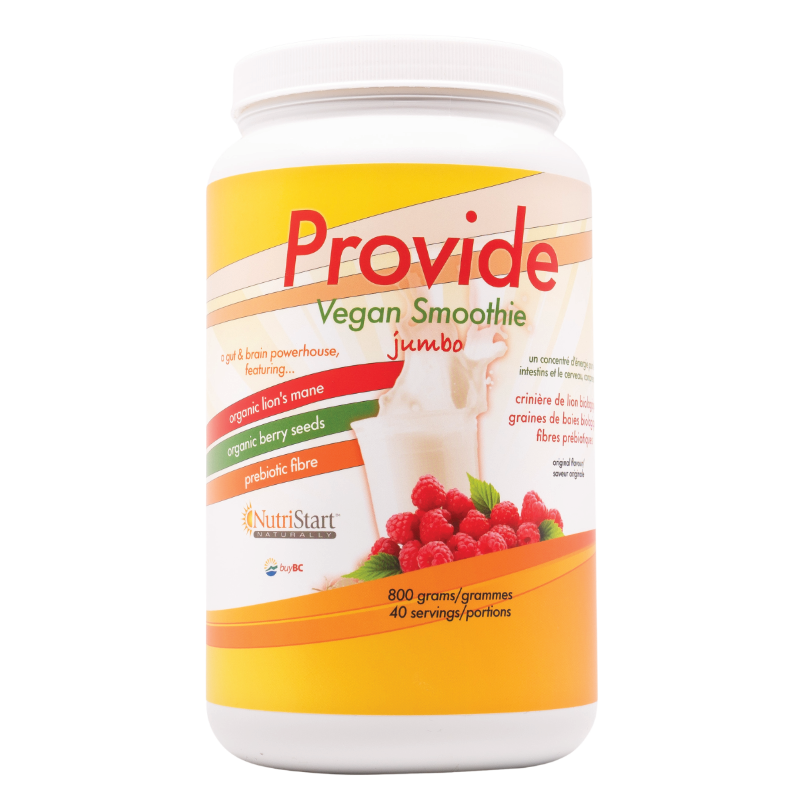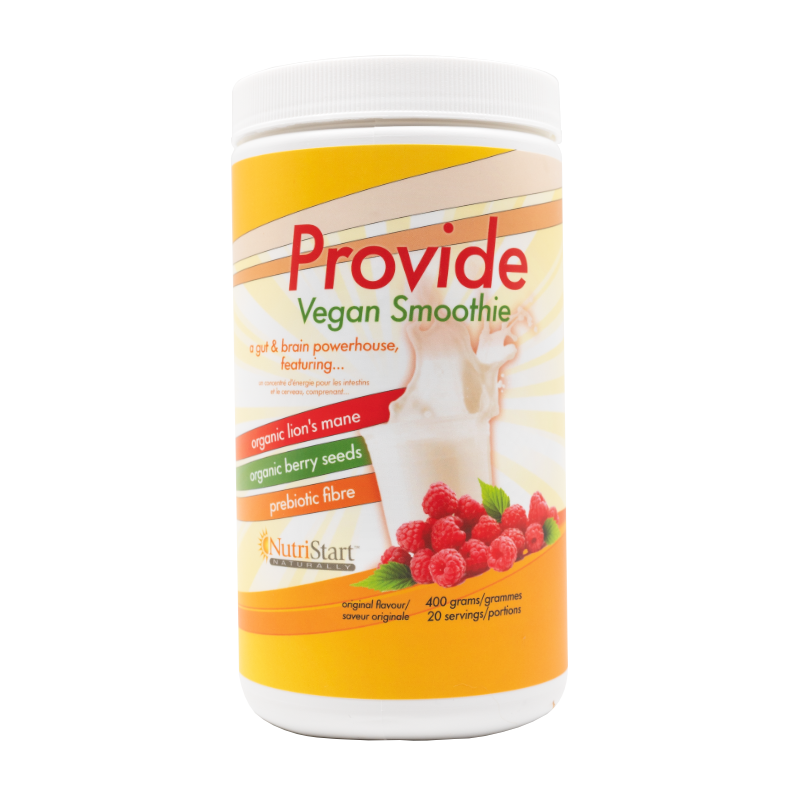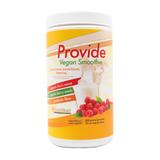


Provide Vegan Smoothie
Regular price
$45.99
Regular price
Provide Vegan Smoothie
Provide Vegan Smoothie is designed to support the link between gut and brain health, serving to revitalize the microbiome while benefiting cognition and memory. This unique formula contains Lion’s Mane mushroom and inulin to encourage healthy communication between the gut and the brain. Along with these powerful nutraceuticals, Provide also contains plant-derived proteins, and an array of berry seed powders to provide a high level of antioxidant protection. Each bottle of Providee contains 20 servings, and each serving (20 gr) provides 12 grams of vegan protein, and is available in Original Natural Vanilla flavour (sweetened with a hint of stevia). It’s a great way to strengthen the relationship between your gut and your brain!
Ingredients
Organic Lion's Mane Powder
Studies from all over the world have discovered the nutritional and health-promoting properties of this mushroom, and its potential applications in medicine. And what properties it has: “The reported health-promoting properties of the mushroom fruit bodies, mycelia, and bioactive pure compounds include antibiotic, anticarcinogenic, antidiabetic, anti-fatigue, antihypertensive, antihyperlipidemic (cholesterol lowering), anti-senescence, cardioprotective, hepatoprotective, nephroprotective, and neuroprotective properties and improvement of anxiety, cognitive function, and depression.” (Source) But, what does Lion’s Mane have to do with the gut/brain axis?
Since some clinical studies have found this mushroom to be protective against colorectal cancer and ulcerative colitis (Source), which are related to gut microbiota, researchers decided to investigate the benefits of Lion’s Mane on the gut microbiome. Thirteen healthy adults were recruited to consume Lion’s Mane powder for seven days straight. “Results showed that daily H. erinaceus (Lion’s Mane) supplementation increased the alpha diversity within the gut microbiota community, upregulated the relative abundance of some short-chain fatty acid (SCFA) producing bacteria and downregulated some pathobionts (pathogenic bacteria).”
In other words, they discovered that only seven days of ingesting Lion’s Mane altered the gut microbiota in a favorable way that could lead to “beneficial health effects”, and may well be involved in “the development of future treatments for central nervous system (CNS) disorders”. (Source)
Inulin
Research has linked inulin to various health benefits, like helping control diabetes, improving digestive health, and aiding weight loss. Inulin is a dietary fibre that can benefit gut health.
Organic Red Raspberry Seed Powder
There are a number of foods naturally rich in a powerful antioxidant known as ellagic acid, and in recent years, much research has been done on the potential of ellagic acid to prevent cancer. According to research performed by Dr. Daniel Nixon, at The Hollings Cancer Institute at the University of South Carolina, ellagic acid can inhibit and stop cancer cell division, and induce apoptosis (normal cell death), in a variety of cancers (breast, colon, esophageal, pancreatic, prostate, and skin). Many years of research on red raspberries by Dr. Nixon led him to conclude that the amount of red raspberries we need to consume, to attain this anticancer benefit, is about one cup per day. This amount provides us with around 40 mg of ellagitannins, the building block from which we make ellagic acid.
“Ellagitannins exhibit antimicrobial activity against fungi, viruses, and importantly, bacteria, including antibiotic-resistant strains such as methicillin-resistant Staphylococcus aureus.” (Source)
As well, these compounds also have anti-inflammatory and antitumor properties, improve the health of blood vessels, lower cholesterol, and reduce gum recession. Other studies, done overseas, suggest that ellagitannins have a host of other potential benefits, including protecting the cardiovascular system, improving wound healing, and preventing birth defects. And, in January of this year (2021), it was determined that “ellagic acid is a neuroprotective polyphenol that can protect against demyelination”. Which means it can be of benefit for all neurological disorders (MS, ALS, Parkinson’s disease, etc). (Source)
Dr. Nixon stated in his research that, “What is interesting to note is the superior efficacy of eating red raspberries as opposed to taking the individual phytochemicals in the form of dietary supplement.” And, further research discovered that the raspberry seeds have a far higher concentration of ellagitannins than the fruit does. In fact, in a nutritional profile of raspberries put out by the Washington State Red Raspberry Commission, it is established that over 70% of the ellagitannins present in the Meeker red raspberry are found in the seeds. Thus, two grams of red raspberry seed powder provides the therapeutic amount of ellagitannins, 40 mg, which is equal to the amount found in one cup of fresh red raspberries. (Source)
Provide contains 1.5 grams of organic Meeker red raspberry seed powder, per serving. As well, this new version of Provide also includes other high antioxidant fruit seed extracts, namely cranberry and grape.
Organic Grape Seed Powder
The cold-milled Organic Grape Seed Powder used in this formula has antioxidant properties, calcium, and vitamin E. Organic Grape Seed Powder’s antioxidant properties are primarily from a high density of polyphenols and proanthocyanidins. Polyphenols are known to help maintain blood pressure levels within the normal range, support immune functions, and promote good circulation. The proanthocyanidins, found in grape seed powder, improve skin appearance and elasticity, which can reduce the signs of aging. Cancer research has found a specific compound in grape seed extract that not only inhibits the growth of prostate cancer tumors but also causes the cells that drive the growth to die. And, in 2009, researchers published a study summarizing evidence that grape seed extract administered to mice was effective in slowing the growth of not only prostate but also skin, colorectal and breast cancers. (Source)
Organic Cranberry Powder
Cranberry Seed Powder contains antioxidants properties derived from anthocyanidins, flavonols, and proanthocyanidins, which support the immune system and gut health. Proanthocyanidins also improve skin appearance and elasticity, reducing signs of aging.
Cranberries protect against UTIs, preventing the adherence of pathogens to cell receptors lining the genitourinary tract. (Source) Furthermore, recent studies have found that cranberry proanthocyanidins (PACs), may also provide support for prostate health.
An in-vitro study, conducted on cranberries by researchers at Dartmouth University and University of Prince Edward Island, demonstrated that cranberry PACs appear to be toxic to human prostate cancer cells by interrupting the cancer cells’ life cycle. (Source)
Plant Protein
The addition of protein to Provide: Balance means it can be used as a short term replacement for a meal, as it provides the equivalent of two large eggs worth of protein. However, we did use a vegan protein for this product, for a number of reasons. The primary reasons for the movement away from animal proteins, both meat and dairy-derived protein powders (whey and casein), are environmental and ethical (animal rights). As well, many are simply allergic to dairy products, or find them difficult to digest.
Thus the new Provide is moving to be more inclusive by using plant proteins that anyone can benefit from, and comfortably include in their diet. And, as this product is designed to work on the gut-brain axis, and to be suitable for those with severe digestive disorders (Inflammatory Bowel Diseases, IBS, etc), it needs to contain the least contentious type of protein available. We chose to use both Pea Protein and Brown Rice Protein in Provide since they are the two most exceptional plant proteins.
Certain amino acids (the building blocks of protein) are considered to be “essential” because they cannot be synthesized in the body and thus must be obtained from the diet.
Pea protein contains all nine essential amino acids, making it a “complete” protein, and brown rice protein is only lacking in one essential amino acid (threonine). Brown rice protein makes up for this by having a higher concentration of the amino acids arginine and valine than whey protein does. Both these plant proteins are also especially rich in the branched-chain amino acids (BCAAs), three aminos (leucine, isoleucine, and valine) required by the body for building and repairing muscle tissue. As well, both proteins are also hypo-allergenic, allowing these proteins to be suitable for those with multiple allergies.
Recommended Serving
Adults mix 1 heaping scoop (20 gr) in 250 ml of liquid. Cut serving in half for children. May be used as frequently as desired.
Health Canada License NPN
Health Canada License for Children NPN

Provide Vegan Smoothie
Recently Viewed

Provide Vegan Smoothie

Provide Vegan Smoothie

Provide Vegan Smoothie

Provide Vegan Smoothie

Provide Vegan Smoothie

Provide Vegan Smoothie

Provide Vegan Smoothie

Provide Vegan Smoothie

Provide Vegan Smoothie


